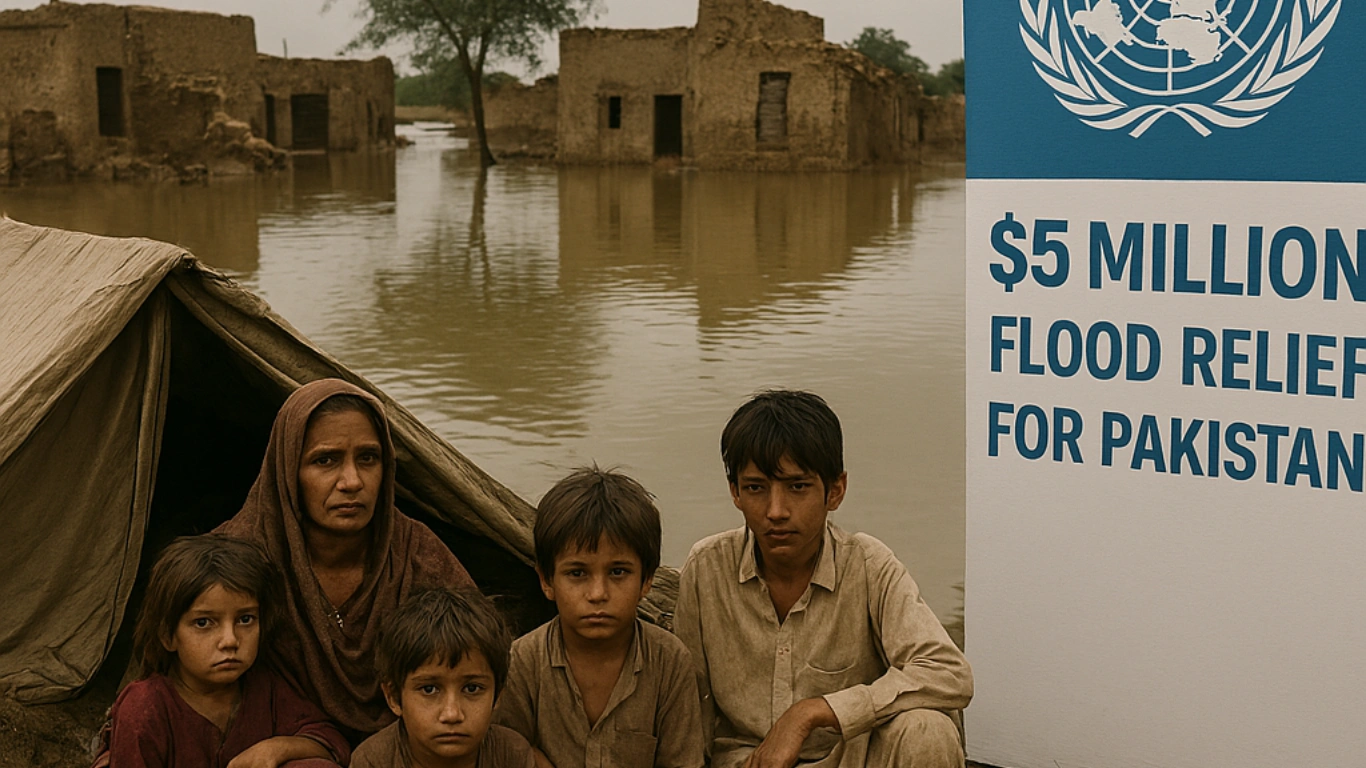UN Sets aside $5 Million for Pakistan’s Flood Relief

The United Nations has just approved $5 million from its Central Emergency Response Fund (UNCERF) to help Pakistan deal with the aftermath of recent floods. UN Relief Chief Mr. Tom Fletcher made the announcement. This amount isn’t huge compared to the country’s overall needs, it’s a timely intervention for families who’ve been hit the hardest.
Impact of UN Funds on Flood-Affected Families
For those who’ve lost homes, farmland, or even loved ones, this support can mean food on the table, a dry place to sleep, and medical care when it’s needed the most. Pakistan has given the statement that it welcomes the allocation. Besides, the country has pointed out that help like this not only saves lives, but also restores some sense of stability for people living through chaos.

The biggest story here is about climate change. Pakistan contributes less than one percent of global carbon emissions, yet it keeps ending up among the worst-hit countries.
Moreover, floods, glacial melts and extreme heat waves aren’t just occasional disasters anymore, but they’re part of a cycle that keeps coming back stronger. That’s what makes this support significant. So, it’s not just about responding to a single flood, but it’s a recognition of the fact that Pakistan is living with the frontline consequences of a global problem it didn’t cause.
It is a fact that $5 million barely scratches the surface.
According to official estimates, Pakistan needs more than $348 billion by 2030 to become resilient to climate impacts. It includes everything from building stronger flood defenses to shifting to renewable energy.
This number feels almost unreal compared to the emergency grants we keep hearing about, but it’s what experts say is necessary.
So, while this new funding is appreciated, it also underscores how massive the financing gap really is. Hence, the international community has to think beyond piecemeal relief and look at long-term investments, otherwise the same cycle of disaster and recovery will repeat itself year after year.
Also Read:SBP Warns Floods Could Challenge Pakistan’s Economic Recovery
The Importance of Solidarity
It is most important that solidarity matters just as much as the cash itself. Support like this gives a manifestation to the people in Pakistan that they aren’t forgotten, and that’s not a small thing when you’re living in a tent after your house has washed away by terrifying floods. It’s also practical that emergency aid keeps disease outbreaks at bay, supports food security, and helps communities start piecing life back together before things spiral further.

Partnerships That Go Beyond Aid
Pakistan has been clear that it values global partnerships, especially ones that complement national relief and recovery work. The government and local agencies do what they can, but international cooperation adds resources and expertise that make a real difference on the ground.
This $5 million from UNCERF is one piece of that larger puzzle. It shows how global institutions can step in quickly when disasters strike.
Besides, it also reveals how much more is needed to move from emergency response to building resilience for the long run.

There’s no sugarcoating it: Pakistan faces a tough road ahead. Climate change isn’t slowing down, and the costs of adaptation are steep. But timely support like this, although modest, reminds us that international solidarity can save lives today. The bigger challenge is to make sure that it also translates into sustained financing and long-term resilience. Resultantly, the country will not be stuck reliving the same tragedies every monsoon season.
Disclaimer: The views and opinions expressed in this article are exclusively those of the author and do not reflect the official stance, policies, or perspectives of the Platform.








